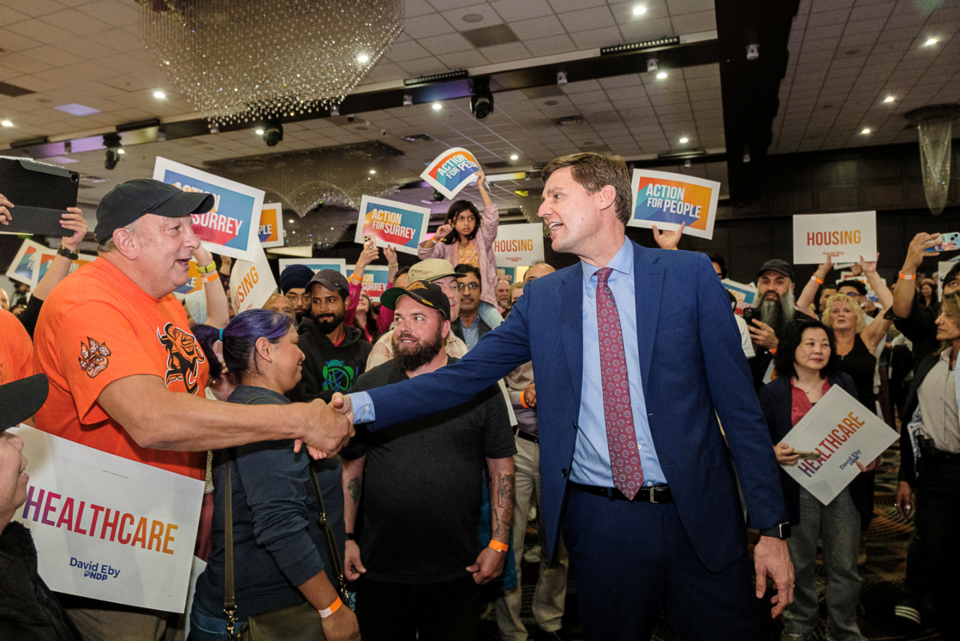I’ve been reflecting a lot about politics these past weeks, with the B.C. and American elections, former B.C. premier John Horgan’s death and lots of political appointments happening on both sides of the border. I also happen to be teaching a university course this term called Politics and Journalism, so the topic is on my mind.
As I tell my students, politics is all about who gets what, when and how. (With a nod to political scientist Harold Lasswell for the saying.) In a democracy, the people choose their government, and that government decides who gets what, when and how.
I never would have expected the American election on Nov. 5 to be decided before the B.C. election held on Oct. 19, but so it was. The B.C. election was a squeaker that relied on recounts for the slimmest of majorities to emerge for the New Democratic Party, while the American election was decided late in the evening on voting day, and the victory included the American presidency, the senate and the house.
I was struck by the different tones taken by everyone in my particular filter bubbles about the American election versus the death of former premier John Horgan on Nov. 12, aged 65, after a third bout with cancer. Horgan resigned as premier in 2022, after five years as premier, after treatment for his second cancer.
Horgan had been working in government since 1991, was premier for five years and his popularity rose while he was in office. He was a rare B.C. premier – he resigned of his own choice, for health reasons, rather than being defeated in an election or forced to resign in a scandal.
And his time in office wasn’t easy. He ruled for two years in a minority government made secure by a confidence and supply agreement between the NDP and the Green Party. He ruled through the pandemic, staying largely behind the scenes as provincial health officer Dr. Bonnie Henry and then-health minister Adrian Dix held daily news conferences.
Horgan’s successor, Premier David Eby, put it well when he said Horgan “sought to address injustice wherever he saw it.” Accolades poured in, from all sides of the political spectrum, recognizing Horgan’s ability to put the best interest of the province above his own self-interest and his willingness to apologize as the head of the government when things went wrong.
It seems like simpler times when such a man could rise to power, but it was a mere two years ago that Horgan resigned. How far we seem to have fallen and how vast the political spectrum appears to have grown. Where once common ground was the goal, now there lies a vast divide. Today, the right wing are the disrupters, and the left are criticized as elites. The political spectrum has flipped itself inside out and upside down, and the vitriol flows like never before.
Finally, on Nov. 18, a full month after the election, Eby’s cabinet was sworn in. Some cabinet ministers stayed in place from the last government, including Attorney General Niki Sharma, Housing Minister Ravi Kahlon and Minister of Children and Family Development Grace Lore.
Adrian Dix, who served as Minister of Health since 2017 and through the pandemic, was given a well-deserved break from that thankless and chaotic job. He’s now Minister of Energy and Climate Solutions.
I was happy to see Kelly Greene, my MLA in Steveston, appointed as a full minister this time around. I assume she will be working closely with Dix, because her ministry is Emergency Management and Climate Readiness.
Education has a new minister, Lisa Beare, who is the MLA for Maple Ridge-Pitt Meadows, first entered politics in 2014 as a school board trustee. An MLA since 2017, she has held previous cabinet posts in tourism, culture, sport and post-secondary education. Like any education minister, she’s got her work cut out for her.
New MLA Christine Boyle gave up her seat on Vancouver City Council to enter provincial politics and will now oversee the Indigenous Relations and Reconciliation ministry, another ministry with high expectations.
It’s a tough crowd for incumbent governments, with inequality at the highest-ever levels, inflation making it tough for people to get by and the many crises our population faces – housing, healthcare, opioid – causing despair. Eby promised to bring down costs for families, strengthen health care, make communities safer, grow the economy, build relationships with Indigenous communities and act on climate change, all while making B.C. more prosperous.
"These are big challenges and tackling them all will take time," Eby said. "While British Columbians may sometimes disagree, we all want the same basic things in life — a good paycheque, a home we can afford in a safe community and high-quality health care that's there when we need it.”
Let’s hope those aren’t empty promises.
Tracy Sherlock is a freelance journalist who writes about education and social issues. Read her blog or email her [email protected].
Got an opinion on this story or any others in Richmond? Send us a letter or email your thoughts or story tips to [email protected]. To stay updated on Richmond news, sign up for our daily headline newsletter. Words missing in article? Your adblocker might be preventing hyperlinked text from appearing.



